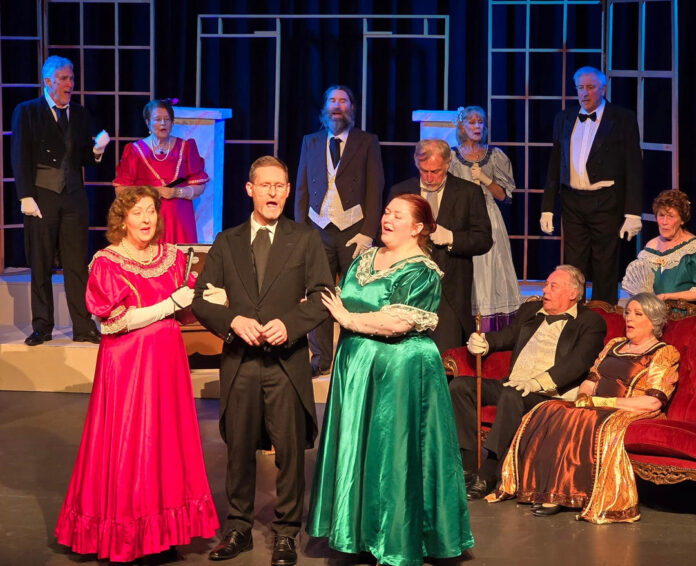Lilac Time is a semi-fictionalized account of a brief but significant part of composer Franz Schubert’s life – his love life to be precise. The book is witty and humorous, the music is gorgeous (it’s by Schubert himself, so nothing more needs to be said!), and SALOS’ production is bright, colourful and earnest (just like young love!).
The main conceit of the story is simple: Schubert has fallen for Mitzi, but he is too awkward and shy to openly court her. He professes his love by writing Mitzi a song but he’s too shy to sing it to her and instead he arranges for his best friend Baron Franz Schober to to do it. But this backfires, and Mitzi falls in love with Schober instead, and Schubert resigns himself to his music. There are sub plots as well involving Mitzi’s two sisters – Litzi and Fritzi, their father and their suitors, a volatile prima donna, a jealous Count, and a detective. The subplots add to the humour, but they also drag out the action – the show comes in around two and three quarter hours inclusive of one interval. (The pace is generally slow.)
Set in Vienna in the 1820’s, the production demands stylized manners, costuming, scenery, and stage properties to suit the period, even though the dialogue evokes the wit and humour of the early nineteen hundreds when the show was written. To make the show look visually authentic costs a lot of money, and SALOS have made a good fist of it even though there are a number of anachronistic elements, such as modern bowtie, dinner suit and shoes, modern ladies hats, Stelvin closure wine bottles (invented in 1964!), and a very modern solo dance in quite modern attire, but this is a small complaint. The ladies’ costumes were lavish and beautifully made, and they were worn with aplomb and bearing. Some of the men’s costumes were similarly visually appealing.
The set was simple and functional, and comprised a raised section with skeletal frame-like structures set in front of either a black traveler curtain or a white cyclorama. Various stage elements were moved around to create three broadly different settings. One of the settings was evocatively lit, with the others treated in a general bland wash. SALOS was unable to use its usual theatre (Tower Arts Centre) for this production and relocated to the better-appointed Domain Theatre, but did not avail themselves of the full capability of its lighting rig. It takes time to adjust!
There were a number of pleasing performances by the principals. Frikkie Jacobs played Baron Franz Schober with confidence. Katrin Treloar’s Mitzi was sweetly sung. David Roberts almost stole every scene he was in with a confident and witty portrayal of Otto Zell, Christian Pollnitz was a genial Vogl. Andrew McKinnon played Schubert with reservation, but at times it was a little too much for this reviewer and restrained his performance. A number of his arias demonstrated his capable tenor voice. His duet in Act 1 with Treloar was especially enjoyable.
A variety of accents were employed across the cast, which became a minor distraction.
The chorus work was enjoyable especially in Act 3 where some of Schubert’s better-known music featured. The sextet in Act 2 was nicely sung: it had volume, pace, and musicality.
Musical Director Helen Loveday ably led a small ensemble (only six musicians: keyboard, violin, cello, flute , clarinet, trumpet) who were always tuneful and played at appropriate tempi. SALOS do however need to give more thought to the physical placement of its orchestra – having it half behind and half in front of the grand curtain is clumsy and distracting, and to this reviewer’s mind is not necessary at either the Domain or the Tower Arts.
SALOS are an indefatigable band of troupers ably led by director Pam Tucker whose smile fills the stage.



